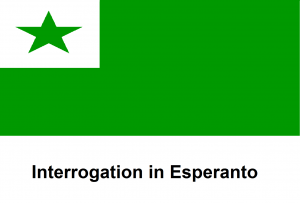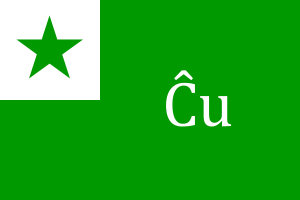Difference between revisions of "Language/Esperanto/Grammar/Interrogation"
Jump to navigation
Jump to search
(Interrogation in Esperanto) |
|||
| Line 1: | Line 1: | ||
[[File:Esperanto | [[File:Interrogation in Esperanto.png|alt=Interrogation in Esperanto|thumb|Interrogation in Esperanto]] | ||
. | |||
Hello everybody, | |||
In today's lesson you will learn some useful vocabulary about '''¨INTERROGATION¨''' in Esperanto. | |||
Feel free to edit this page by adding new words and expressions ! | |||
Good learning ! :) | |||
. | |||
. | |||
== '''Some examples for Interrogation in Esperanto''' == | |||
{| class="wikitable sortable" | |||
!<big>'''ENGLISH'''</big> | |||
!<big>'''PRONUNCIATION'''</big> | |||
'''<big>ENGLISH</big>''' | |||
!'''<big>ESPERANTO</big>''' | |||
!'''<big>PRONUNCIATION</big>''' | |||
'''<big>BRAZILIAN</big>''' | |||
'''<big>PORTUGUESE</big>''' | |||
!'''<big>BRAZILIAN</big>''' | |||
'''<big>PORTUGUESE</big>''' | |||
|- | |||
| | |||
| | |||
| | |||
| | |||
| | |||
|- | |||
|You have a car | |||
|bih hah vahs ow tohn | |||
|'''<big>Vi havas aŭton</big>''' | |||
| | |||
| | |||
|- | |||
|Do you have a car? | |||
|chou vih hah vahs ow tohn ? | |||
|'''<big>Ĉu vi havas aŭton ?</big>''' | |||
| | |||
| | |||
|- | |||
| | |||
| | |||
| | |||
| | |||
| | |||
|- | |||
|I have | |||
to work now | |||
|mih deh vahs | |||
lah boh rih noon | |||
|'''<big>Mi devas</big>''' | |||
'''<big>labori nun.</big>''' | |||
| | |||
| | |||
|- | |||
|Do I have | |||
to work now? | |||
| | |||
|'''<big>Ĉu mi devas</big>''' | |||
'''<big>labori nun?</big>''' | |||
| | |||
| | |||
|- | |||
| | |||
| | |||
| | |||
| | |||
| | |||
|- | |||
|Who ate | |||
my eggs ? | |||
| | |||
|'''<big>Kiu manĝis</big>''' | |||
'''<big>miaj ovojn ?</big>''' | |||
| | |||
| | |||
|- | |||
|Which (one) | |||
is my egg? | |||
| | |||
|'''<big>Kiu estas</big>''' | |||
'''<big>mia ovo ?</big>''' | |||
| | |||
| | |||
|- | |||
|How many cars | |||
do you have ? | |||
| | |||
|'''<big>Kiom da aŭton</big>''' | |||
'''<big>vi havas ?</big>''' | |||
| | |||
| | |||
|- | |||
|Where | |||
do you live ? | |||
| | |||
|'''<big>Kie</big>''' | |||
'''<big>vi logas ?</big>''' | |||
| | |||
| | |||
|- | |||
|What is | |||
beautiful ? | |||
| | |||
|'''<big>Kio</big>''' | |||
'''<big>estas bela ?</big>''' | |||
| | |||
| | |||
|- | |||
|When did you | |||
eat my eggs ? | |||
| | |||
|'''<big>Kiam vi manĝis</big>''' | |||
'''<big>miajn ovojn ?</big>''' | |||
| | |||
| | |||
|- | |||
|Why did you | |||
eat my eggs ? | |||
| | |||
|'''<big>Kial vi manĝis</big>''' | |||
'''<big>miajn ovojn?</big>''' | |||
| | |||
| | |||
|} | |||
In Esperanto, when you want to ask a 'yes or no' question, you only need to add a "ĉu" at the beginning of the sentence. | In Esperanto, when you want to ask a 'yes or no' question, you only need to add a "ĉu" at the beginning of the sentence. | ||
*You have a car. - Vi havas aŭton. | *You have a car. - Vi havas aŭton. | ||
| Line 17: | Line 165: | ||
* What is beautiful? - Kio estas bela? | * What is beautiful? - Kio estas bela? | ||
* When did you eat my eggs?- Kiam vi manĝis miajn ovojn? | * When did you eat my eggs?- Kiam vi manĝis miajn ovojn? | ||
* Why did you eat my eggs? - Kial vi manĝis miajn ovojn? | * Why did you eat my eggs? - Kial vi manĝis miajn ovojn?[[File:Esperanto interrogation.png|thumb]] | ||
Revision as of 20:15, 9 April 2020
.
Hello everybody,
In today's lesson you will learn some useful vocabulary about ¨INTERROGATION¨ in Esperanto.
Feel free to edit this page by adding new words and expressions !
Good learning ! :)
.
.
Some examples for Interrogation in Esperanto
| ENGLISH | PRONUNCIATION
ENGLISH |
ESPERANTO | PRONUNCIATION
BRAZILIAN PORTUGUESE |
BRAZILIAN
PORTUGUESE |
|---|---|---|---|---|
| You have a car | bih hah vahs ow tohn | Vi havas aŭton | ||
| Do you have a car? | chou vih hah vahs ow tohn ? | Ĉu vi havas aŭton ? | ||
| I have
to work now |
mih deh vahs
lah boh rih noon |
Mi devas
labori nun. |
||
| Do I have
to work now? |
Ĉu mi devas
labori nun? |
|||
| Who ate
my eggs ? |
Kiu manĝis
miaj ovojn ? |
|||
| Which (one)
is my egg? |
Kiu estas
mia ovo ? |
|||
| How many cars
do you have ? |
Kiom da aŭton
vi havas ? |
|||
| Where
do you live ? |
Kie
vi logas ? |
|||
| What is
beautiful ? |
Kio
estas bela ? |
|||
| When did you
eat my eggs ? |
Kiam vi manĝis
miajn ovojn ? |
|||
| Why did you
eat my eggs ? |
Kial vi manĝis
miajn ovojn? |
In Esperanto, when you want to ask a 'yes or no' question, you only need to add a "ĉu" at the beginning of the sentence.
- You have a car. - Vi havas aŭton.
- Do you have a car? - Ĉu vi havas aŭton?
- I have to work now. - Mi devas labori nun.
- Do I have to work now? - Ĉu mi devas labori nun?
Other questions start with:
- Who ate my eggs? - Kiu manĝis miaj ovojn?
- Which (one) is my egg? - Kiu estas mia ovo?
- How many cars do you have? - Kiom da aŭton vi havas?
- Where do you live? - Kie vi logas?
- What is beautiful? - Kio estas bela?
- When did you eat my eggs?- Kiam vi manĝis miajn ovojn?
- Why did you eat my eggs? - Kial vi manĝis miajn ovojn?

